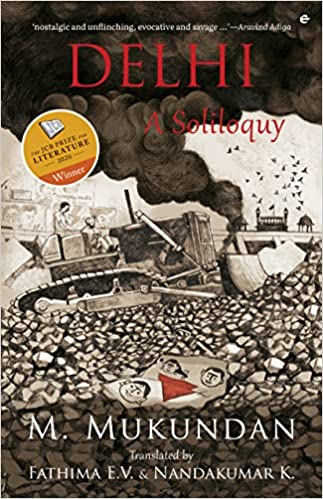Why Did I Pick this book?
You know the type of books you read and browse, which show up as suggestions to you. Artificial Intelligence at work, the internet knows my choices, and based on that, it suggested Delhi: A Soliloquy. I read the description and found the book to be a promising read, so I picked it up.
Another reason was that I have read a few translations from regional languages like Tamil and found the storytelling very interesting and engaging. You get to know a lot about the culture, customs, traditions, and the general thought process and perspectives of the people from various parts of India.
The book
The Storyline
Delhi: A Soliloquy is a fine read, telling the story of Delhi through the lives of some Malayali families, who moved to Delhi post-independence in search of jobs.
The story begins with the arrival of Sahadevan in Delhi in 1959, as a twenty-year-old boy, and moves along, capturing his life and the lives of people around him. It also captures the city of Delhi beautifully, all its landmarks, government colonies, markets, and the growth of the city. It’s a fine blend of history and literature.
Different places he worked, different places he lived, different friends he made in the city, and the different people he met during his time in Delhi, the author weaves all of them together to create an emotionally moving and nostalgic piece of work.
Prospective Readers
If you are from Delhi, you will love it as you will relate to almost everything. If you have a thing for history and politics, it will give you a fair amount of both. Written in simple and easy-to-understand English, the book takes you on a trip down memory lane with all sorts of emotions.
Inside The Book
The author creates a masterpiece of a story, weaving history and literature in such a way that not only does it take you through the various human emotions, but also takes you on the trip of major historical events of India.
The central protagonist, Sahdevan, arrives in Delhi in the year 1959 and lives with one of the family members known to him from his village, who helped him find a job. From there started his life journey in Delhi and his monologue with himself.
The author has captured the journey of growth of Delhi from the 1960s to the 90. It takes you through the important events since the 1960s and their impacts on the lives of people in the country. The 1962 war with China, the 1965 war with Pakistan, the 1971 war with Pakistan and the creation of Bangladesh, the emergency, the atrocities done during the emergency, Operation Blue Star, the assassination of Indira Gandhi, the aftermath of the assassination, the anti-Sikh riots, the capital city of Delhi witnessed. The book takes you through all this and much more.
The author also creates a montage of the people he met and his relationship with all of them. Sreedharaunni, the trade union leader and his wife Devi, with whom he stayed when he landed in Delhi, Kunhikrishnan, a firebrand journalist, and his wife Lalitha, a maverick and nomadic artist, Vasu, the call girl Rosily, Devi’s son Satyanathan and a JNU student Janakikutty all Malayalis living in Delhi.
What is Interesting about the Book?
The storytelling is the most interesting part of the book. It takes you on a journey filled with emotions. I was able to relate more with the book as I know the city a bit. I also came from a small town to Delhi in search of a job, and it is the city that gave me my first job. Even if you have never lived in Delhi, the author describes it so well that you can visualize it.
About the Author
M. Mukundan was born and brought up in Mahe. He rose to critical acclaim and popularity with Mayyazhippuzhayude Theerangalil (1974). Delhi Gathakal (2011), translated as Delhi: A Soliloquy, is based on his experiences of living and working in Delhi for forty years as a Cultural Attaché at the French embassy. In 2004, he retired from that position and returned to Mahe, his hometown.
About The Translators
Fathima E.V. is an award-winning writer and translator. She holds an MA and a PhD from the University of Calicut, and completed the TESOL course from the University of Surrey. Currently, she heads the department of English at Krishna Menon Memorial Government Women’s College, Kannur.
Nandakumar K. started his career as a sub-editor at Financial Express. He is now an empanelled copy editor with Indian publishers and IIM Ahmedabad. Delhi: A Soliloquy is his first published translation from Malayalam. He lives and works in Dubai. Nandakumar is the grandson of Mahakavi Vallathol Narayana Menon.
Our Verdict
Delhi: A Soliloquy is storytelling at its best. A must-read for anyone and everyone who has lived in Delhi or has an association with Delhi. If you have an interest in the history of the city and want to know and read about the growth and changing landscape of a city, this one is a must-read. A perfect blend of history and master storytelling.
